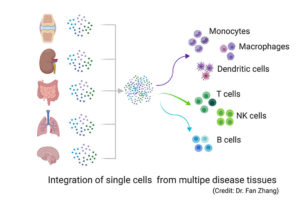Cytokine storm syndromes are associated with autoimmune diseases such as systemic juvenile idiopathic arthritis (sJIA), adult onset Still’s disease and systemic lupus erythematosus. Speculation is mounting that they may also play a role in severe cases of COVID-19.
“We don’t know for sure yet if there’s cytokine storm in COVID-19, but it certainly looks that way in some patients,” said Peter A. Nigrovic, MD, director of the Brigham and Women’s Hospital Center for Adults with Pediatric Rheumatic Illness and the principal investigator of a basic science laboratory focused on mechanisms of inflammation. “Based on some of the findings in the blood of the sickest individuals, it may well be that the immune system mediates damage rather than serving to protect the host. We want to be able to recognize those cases where immunosuppression could optimize patient outcomes.” Read More


 This November, members of Brigham and Women’s Hospital’s Division of Rheumatology, Inflammation and Immunity presented several groundbreaking studies at the American College of Rheumatology’s (ACR’s) annual meeting in Atlanta.
This November, members of Brigham and Women’s Hospital’s Division of Rheumatology, Inflammation and Immunity presented several groundbreaking studies at the American College of Rheumatology’s (ACR’s) annual meeting in Atlanta.